
 From July 10-14, Enele 2017, the third edition of the International Encounter for Continuing Professional Development of Spanish Teachers, will take place at the Modern Language Center of the University of Cadiz, Spain. Organized by Language and Cultural Encounters (LCE), Enele gives teachers of Spanish (and of other languages) the opportunity to reflect on the teaching and learning of foreign languages, to share teaching experiences and to learn about new tendencies, tools and materials.
From July 10-14, Enele 2017, the third edition of the International Encounter for Continuing Professional Development of Spanish Teachers, will take place at the Modern Language Center of the University of Cadiz, Spain. Organized by Language and Cultural Encounters (LCE), Enele gives teachers of Spanish (and of other languages) the opportunity to reflect on the teaching and learning of foreign languages, to share teaching experiences and to learn about new tendencies, tools and materials.
Enele is a project created and coordinated by professor Jane Arnold of the University of Seville and academic director of Language and Cultural Encounters. It is designed to provide language teachers with the opportunity to meet and reflect on diverse professional issues with other teachers from around the world, as well as to further develop their skills working with important current proposals for language teaching. In Dr. Arnold’s words, Enele offers “a perfect occasion to unite the useful and the enjoyable”. On the one hand, it presents a program that has been prepared “with great care to contribute to professional development of teachers”. On the other hand, “there is nothing better than sharing experiences with teachers from around the world in such a pleasant setting as that offered by the city of Cadiz with its beautiful coastline”.
This is the third Encounter organized by LCE. Last year 50 teachers came to Cadiz from 15 countries, including Austria, UK, Holland, Belgium, Germany, Italy, U.S., Argentina, Brazil,  the Dominican Republic, Algeria, Morocco, and Russia. At the two previous events, according to Arnold, there were “real learning communities created, with participants sharing their ideas and greatly enriching the experience of the group”, a group which was formed not only by teachers of Spanish but also of other languages.
the Dominican Republic, Algeria, Morocco, and Russia. At the two previous events, according to Arnold, there were “real learning communities created, with participants sharing their ideas and greatly enriching the experience of the group”, a group which was formed not only by teachers of Spanish but also of other languages.
Enele 2017 has as its slogan CREAR, JUGAR, EMOCIONAR: Explorando nuevos caminos en la enseñanza de ELE (CREATE, PLAY, EXCITE. Exploring new paths in the teaching of Spanish as a foreign language). The speakers, who will give a plenary, three training modules and three workshops, are well-known experts, with extensive experience in teacher training. They want to share new options for educational practice involving active learning and more participation by the students in the construction of their knowledge of the language and the culture which they are studying. They will provide ways to stimulate learners’ curiosity and to create an atmosphere in the classroom where learners want to learn, where they are engaged. Engagement will be stressed in the presentations; it is an important element in teaching since as Fredericks, Blumenfeld and Paris (2004:60) explain, it “draws on the idea of participation; it includes involvement in academic and social or extracurricular activities and is considered crucial for achieving positive academic outcomes ”.
Critical reflection about teaching, exchange of experiences, innovative methodology and many resources and tools for the classroom
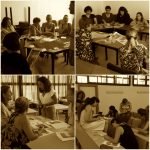
The main objectives of this international encounter are to reflect about current teaching resources for our classrooms, including gamification, which can stimulate our students’ curiosity and interest; to learn about the contributions of the neurosciences to teaching; to examine creative ways to present aspects of the language, such as grammar, for more effective learning; to see how to best take advantage of our materials; to deal with the group dynamics in order to bring about more active participation of the students in communicative activities; to develop the ability to create motivating activities which successfully involve students in learning the language ; and to generate a community of learning in the encounter where participants share experiences and good practices.
In Enele 2017 a dynamic methodology based on reflection, participation, and collaboration among the participants will be used, always keeping in mind the realities of the language classroom.
Working together, speakers and participants critically analyze teaching practice and explore
strategies which support continued professional development, defining objectives and steps needed to reach them. In the theoretical/practical classes of the encounter the assimilation of the contents of the modules and workshops will be facilitated in an entertaining and productive manner.
Academic Program
Enele 2017 places emphasis on the importance of attention to affective factors in language learning since as Arnold (2011:11) summarizes, in any language teaching eontext “attention to affect will make our teaching more effective”. The modules and workshops will offer suggestions for stimulating students’ creativity, for creating useful classroom materials and for exploring ways to interest and motivate our students.
The encounter includes a plenary presented by the professor and neuroscientist Dr. Francisco Mora Teruel: ¿Qué nos dice la Neuroeducación sobre el papel del cerebro y la emoción en la enseñanza de ELE? (What does Neuroeducation tell us about the role of the brain and emotion in the teaching of Spanish as a foreign language?). Dr. Mora will explore ways to improve what happens in the classroom through the study of the brain, its processes and by taking into account the central role of emotions in the process of learning.
Enele 2017 also has three modules which deal in depth with diverse issues, from effective teaching materials to communicative processes in the classroom, creative writing and many more things. The speakers are Neus Sans: ¿De dónde venimos, dónde estamos y adónde vamos? Criterios para el diseño y la selección de materiales didácticos para la clase de ELE (Where do we come from, where are we and where are we going? Criteria for designing and choosing teaching materials for the Spanish class), Miguel Ángel García Argüez: Hacia una pedagogía de la creatividad. Los “juegos de escritura” en la enseñanza de ELE (Towards a creative pedagogy.”Writing games” in Spanish teaching); and Concha Julián de Vega: Conectando mentes, comunicando en ELE (Connecting minds, communicating in Spanish).
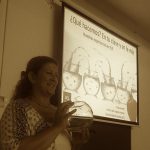
Cultural program
Enele 2017 is not only an encounter for continuing professional development of language teachers, it also includes “moments for sharing” where participants and speakers have the opportunity to share teaching experiences at the same time as they get to know Cadiz, a city in the south of Spain with many beautiful places by the sea and with a vibrant culture. It’s one of the oldest cities in Western Europe, with an influential history of more than 3000 years which is reflected in a multitude of lovely sites.
Cadiz is a city in a continual process of creation with its inhabitants always involved in preparing songs and costumes for its famous Carnival celebration where the Spanish language is a tool for social and political criticism through music and humor. Its history, its university, its people, its great weather, and its marvelous beaches make it the perfect setting for Enele 2017. Also, Cadiz is near to other wonderful cities worth visiting, such as, Jerez, Puerto de Santa María, Seville, Cordoba, or Málaga.
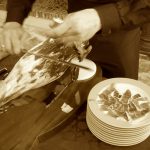
Enele 2017 is organized by Language and Cultural Encounters and coordinated by Jane Arnold. It takes place in the Modern Language Center of the University of Cadiz and is also supported by the following institutions: Fundación Universidad-Empresa de Cádiz, the Cadiz city council, the Ministry of Education of the Spanish Embassy in the UK and Ireland, Difusión publishing house, CLIC-International House Cádiz, FEDELE (Association of Spanish language schools), ACEIA (Association of language teaching centers in Andalusia), ELE Lovaina, Educación 3.0, Cadiz centro Student Residence.
References
Arnold, J. (2011). “Attention to affect in language learning”. Anglistik. International Journal of
English Studies 22 (1):11-22.
Fredricks, J. A., Blumenfeld, P. C., and Paris, A. H. (2004). “School engagement: Potential of the concept, state of the evidence”. Review of Educational Research 74 (1): 59-109.





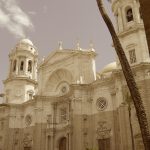 From July 10-14,
From July 10-14, 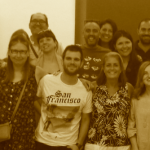 the Dominican Republic, Algeria, Morocco, and Russia. At the two previous events, according to Arnold, there were “real learning communities created, with participants sharing their ideas and greatly enriching the experience of the group”, a group which was formed not only by teachers of Spanish but also of other languages.
the Dominican Republic, Algeria, Morocco, and Russia. At the two previous events, according to Arnold, there were “real learning communities created, with participants sharing their ideas and greatly enriching the experience of the group”, a group which was formed not only by teachers of Spanish but also of other languages.
